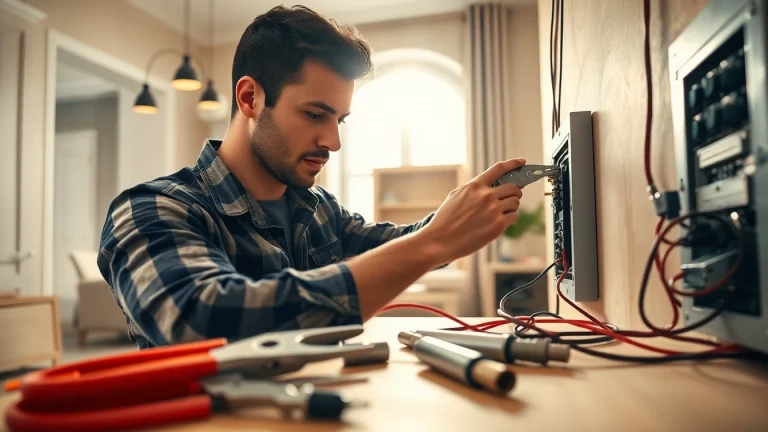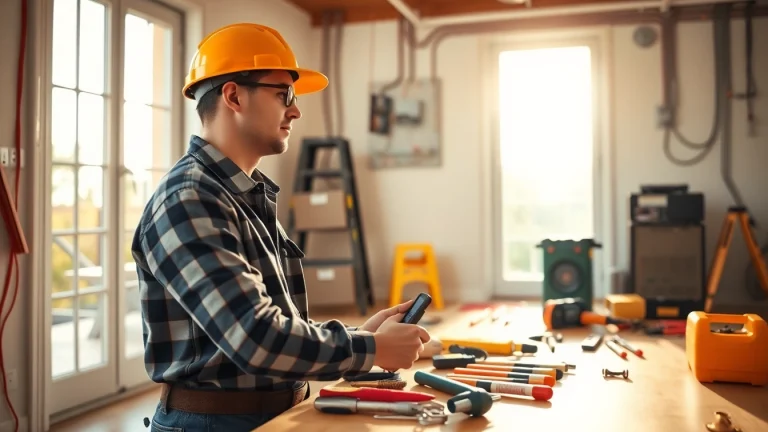
Comprehensive Guide to Hiring and Working with an Electrician
Understanding the Role of an Electrician
Electricians are essential to both commercial and residential sectors, performing a variety of tasks that ensure the safety and functionality of electrical systems. They are skilled tradespeople with expertise in electrical wiring, maintenance, and repair. In this comprehensive guide, we will explore the multifaceted role of an Electrician, their qualifications, and how they contribute to the safety and efficiency of our electrical systems.
What Does an Electrician Do?
Electricians install, maintain, and repair electrical powered systems in homes, businesses, and various infrastructures. Their job scope includes:
- Installing wiring systems in new constructions.
- Upgrading existing electrical systems to meet modern standards.
- Diagnosing and repairing electrical faults and issues.
- Ensuring all installations and repairs comply with safety codes and regulations.
- Working on lighting systems, outlets, circuit breakers, and more.
Key Skills and Qualifications of Electricians
To perform effectively, electricians must possess a blend of technical skills, theoretical knowledge, and practical experience. Key skills include:
- Technical Skills: Proficient in reading blueprints and technical diagrams, understanding electrical codes, and using various tools and equipment safely.
- Problem-Solving Skills: Ability to diagnose issues quickly and develop effective solutions.
- Attention to Detail: Ensuring precise measurement and installation prevents costly mistakes and enhances safety.
Qualifications typically include completion of a high school diploma, followed by an apprenticeship program, which includes practical experience under the guidance of experienced electricians.
Types of Electricians and Their Specializations
Electricians can specialize in different areas of electrical work. The main types include:
- Residential Electricians: Focus on home wiring, installation of fixtures, and ensuring electrical safety for residential properties.
- Commercial Electricians: Work in commercial settings, responsible for the installation and maintenance of electrical systems in retail spaces, offices, and other business environments.
- Industrial Electricians: Specialize in the electrical systems of factories and industrial facilities, focusing on high voltage systems and heavy machinery.
- Lineworkers: Work on power lines and electrical infrastructure, responsible for maintaining electrical transmission systems.
How to Choose the Right Electrician for Your Project
Selecting the right electrician for your project is critical for ensuring safety and quality workmanship. Here are some steps to guide your selection process.
Evaluating Credentials and Experience
Before hiring, verify the electrician’s credentials. Look for:
- Licenses: Ensure that the electrician holds the necessary state and local licenses to work legally in your area.
- Certifications: Certifications from recognized trade organizations can showcase additional skills and knowledge.
- Experience: Inquire about their years of experience, particularly in projects similar to yours.
Interviewing Electricians: Key Questions to Ask
A personal interview can help you assess whether an electrician is the right fit for your project. Key questions to consider include:
- What types of projects have you completed in the past?
- Can you provide references from previous clients?
- What warranty do you offer on your work?
- How do you handle unexpected costs or changes during a project?
Understanding Cost Structures and Estimates
Cost is an essential factor when hiring an electrician. A reliable electrician will provide a detailed estimate that includes:
- Labor costs
- Materials needed
- Any necessary permits or inspections
- Contingency for unforeseen issues or changes
Comparing estimates from different electricians can help you find the best value without compromising quality.
Common Electrical Issues and Solutions
Electrical systems in homes and businesses can experience various issues. Understanding these problems and knowing when to seek professional assistance is crucial for safety.
Identifying Electrical Problems in Your Home
Common signs of electrical issues include:
- Frequent circuit breaker trips
- Flickering lights
- Burning smells or scorch marks near outlets
- Inconsistent power to appliances
Essential Maintenance Tips for Homeowners
Regular maintenance can help prevent electrical issues before they arise. Here are practical tips:
- Schedule periodic inspections with a qualified electrician.
- Replace damaged or worn-out cords and plugs immediately.
- Avoid overloading circuits by using power strips judiciously.
- Keep the area around outlets clear of clutter.
Emergency Electrical Services: When to Call
In the event of a serious electrical issue, prompt intervention is crucial. Situations requiring immediate professional help include:
- Experiencing electrical shocks when using appliances.
- Visible sparks or smoke from outlets or wires.
- Power outages affecting only part of your home.
Safety Practices in Electrical Work
Safety should always be a priority when it comes to electrical work, both for electricians and homeowners.
Importance of Safety Protocols for Electricians
Electricians follow specific safety protocols to minimize risks associated with their work. Essential safety measures include:
- Utilizing personal protective equipment (PPE), such as gloves and helmets.
- Isolating electrical sources before beginning work.
- Regular training on safety standards and practices.
Consumer Safety: Protecting Your Home
Homeowners can also play a role in electrical safety. Here are some practices to adopt:
- Use surge protectors for devices prone to power fluctuations.
- Install Ground Fault Circuit Interrupters (GFCIs) in areas like kitchens and bathrooms.
- Ensure proper usage of extension cords, avoiding long-term use as a substitute for permanent wiring.
Learning About Local Electrical Codes and Regulations
Compliance with local electrical codes is vital for safety and legality. Homeowners should familiarize themselves with:
- National Electrical Code (NEC)
- Local building regulations
- Permitting processes for electrical work
Future Trends in the Electrical Industry
The electrical industry is evolving, influenced by technological advancements and societal shifts. Understanding these trends will help electricians shape their practices and remain competitive.
Emerging Technologies Affecting Electricians
Several technologies are transforming the electrical industry, including:
- Smart Home Technology: Integration of smart devices requires electricians to be familiar with automation and networking.
- Renewable Energy Solutions: Growing interest in solar panels and energy-efficient systems is influencing electricians’ work scopes.
- Electric Vehicles (EV): The need for EV charging stations is becoming a new area of specialization within the electrical field.
Green Energy Solutions and Electricians’ Roles
As communities push for sustainability, electricians will increasingly focus on:
- Installing and maintaining solar energy systems.
- Integrating energy storage solutions to optimize energy use.
- Implementing energy-efficient lighting and appliances.
How to Support New Electricians in the Field
In an ever-evolving industry, supporting new electricians is crucial. This can be achieved through:
- Offering mentorship programs for apprentices.
- Providing access to ongoing training and professional development.
- Encouraging networking opportunities within the electrical community.


